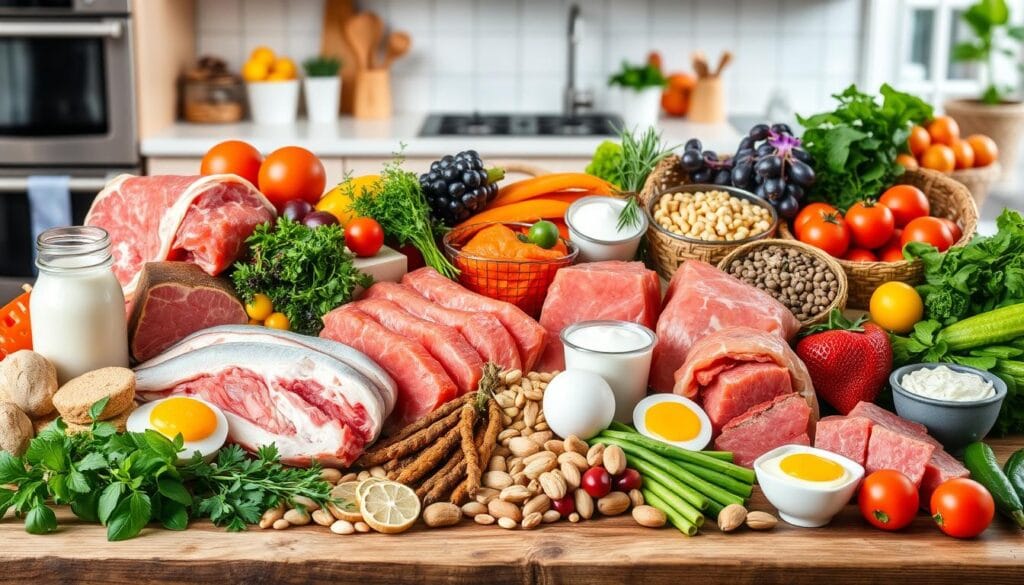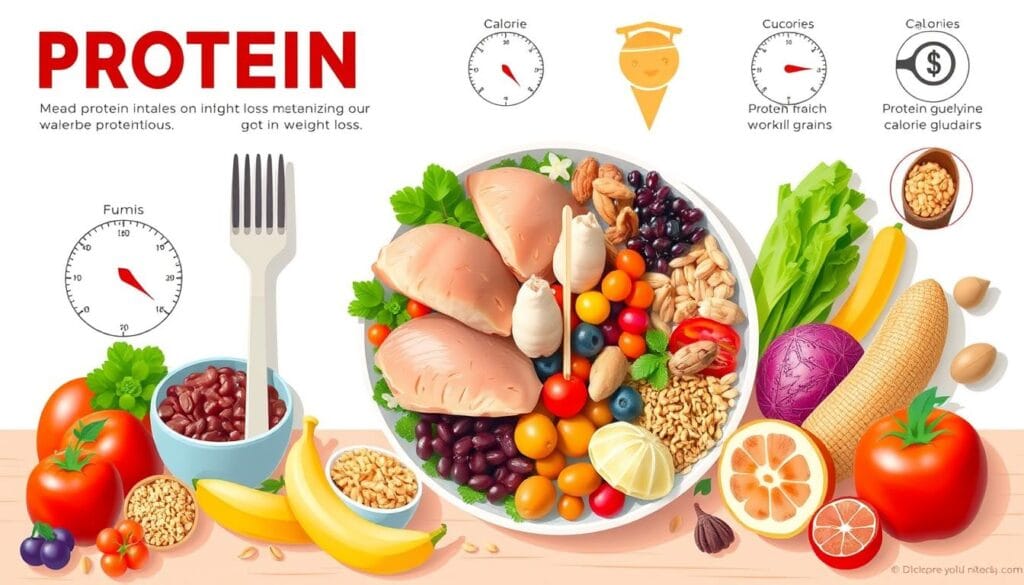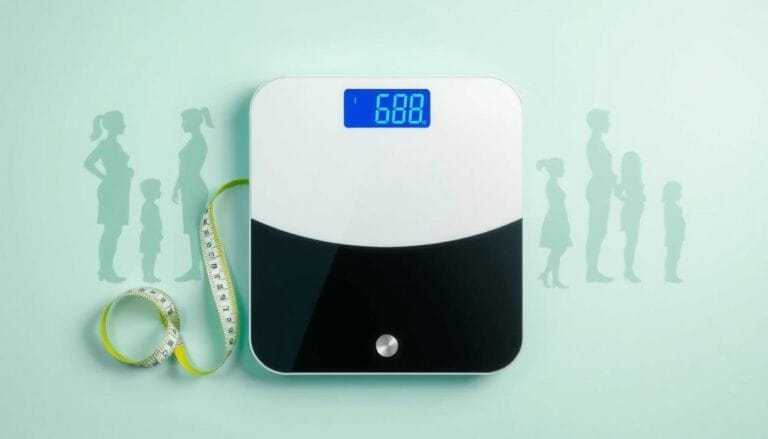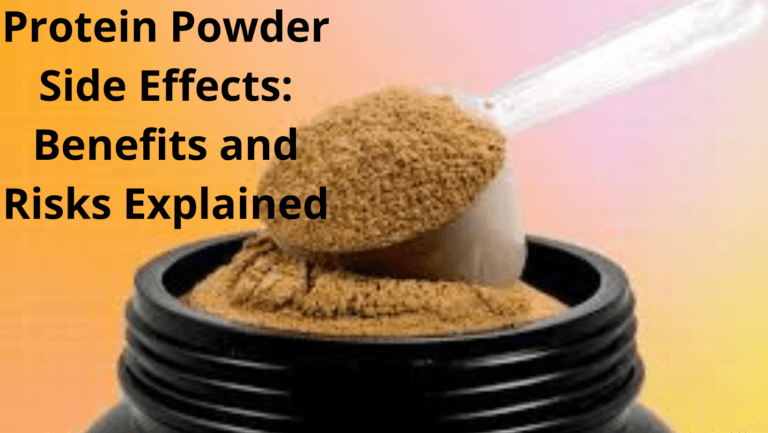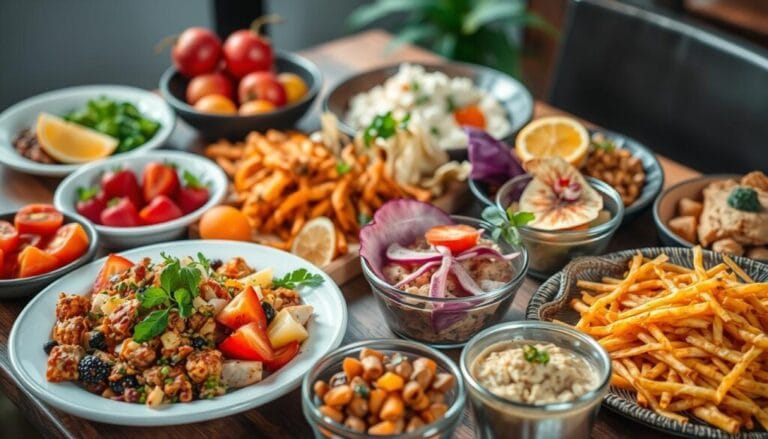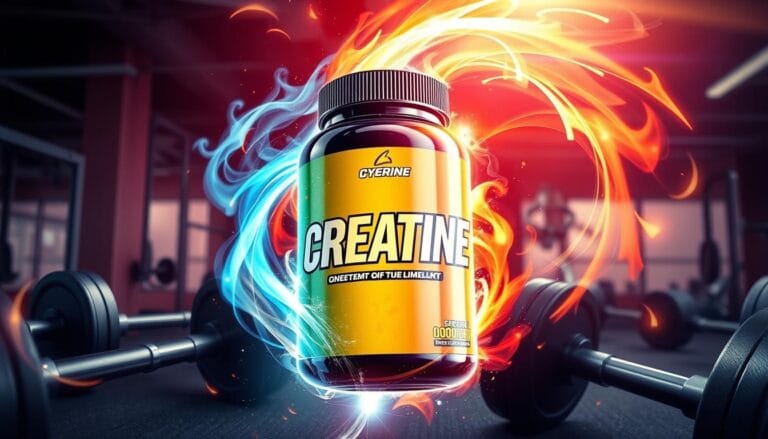7 day protein diet plan for weight loss
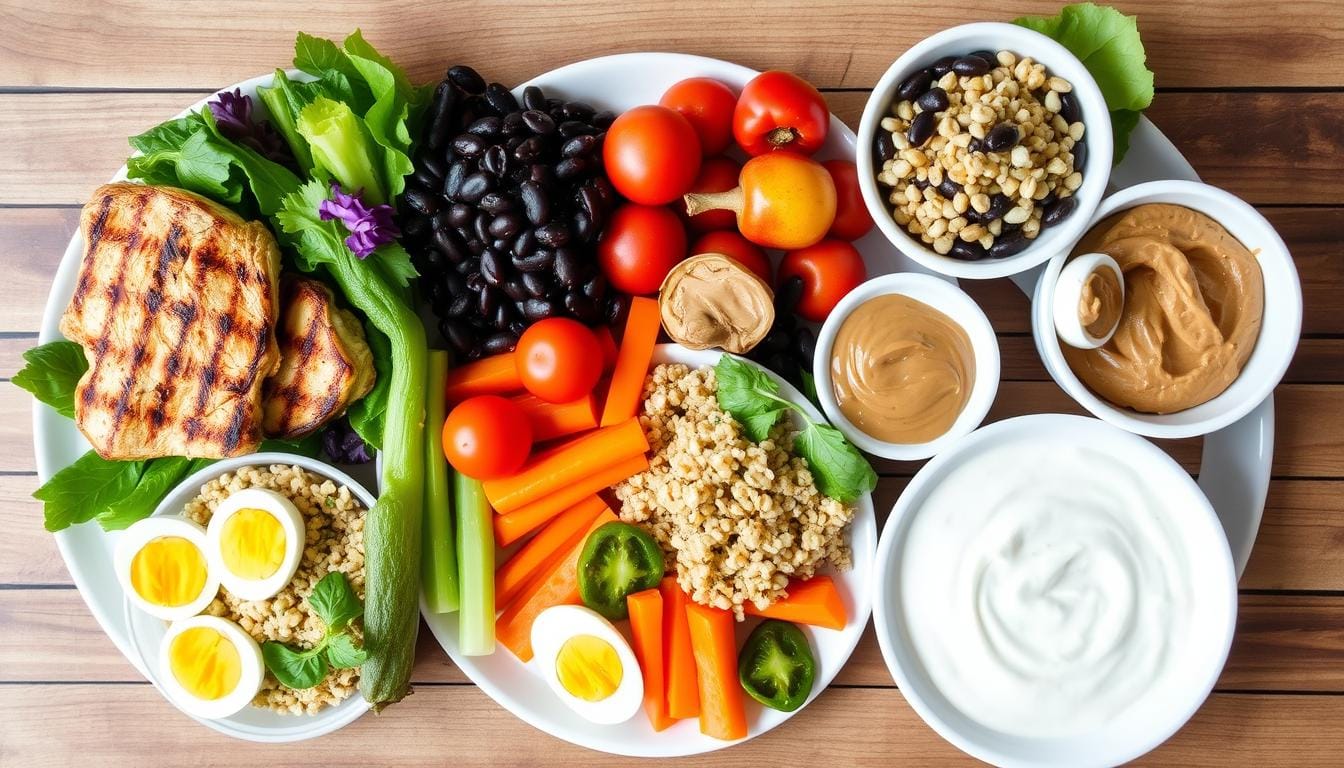
Starting a weight loss journey can seem daunting. But, what if you could change your eating habits with a smart protein diet plan? Kelly Clarkson’s amazing weight loss shows how the right nutrition can change your health and fitness goals.
This 7 day protein diet plan for weight loss is made to help you lose weight while keeping your muscles and energy up. It focuses on high-protein meals and portion control. This way, you’ll find a lasting way to lose weight, unlike restrictive diets.
Your body is incredibly powerful, and the right food can unlock its full potential. This protein-based method is not just for losing weight. It’s about building a lifestyle that supports your health and fitness goals.
Table of Contents
Key Takeaways
- Achieve weight loss with a targeted protein diet plan
- Consume at least 80 grams of protein daily
- Maintain consistent energy through balanced calorie intake
- Adapt the plan to your personal calorie needs
- Support muscle preservation during weight loss
Understanding the Benefits of High-Protein Diets
Protein is key to changing how you see your body and boosting your health. It’s especially helpful if you have a thyroid condition or want to lose weight. Learning about protein’s power can change your eating habits for the better.
High-protein diets are great for improving your metabolic health and losing weight. Research shows protein’s big impact on how your body looks and how it uses energy.
Role of Protein in Weight Loss
Protein is more than a nutrient; it’s a weight management tool. Here are its main benefits:
- Increases satiety and reduces hunger
- Supports muscle preservation during weight loss
- Boosts metabolism naturally
- Helps stabilize blood sugar levels
Scientific Evidence Behind Protein and Fat Burning
“Protein is the cornerstone of metabolic transformation” – Nutrition Research Journal
Research shows protein’s ability to burn fat:
| Protein Intake | Metabolic Impact | Weight Loss Potential |
|---|---|---|
| 50-60g Daily | Basic Maintenance | Moderate |
| 80-100g Daily | Enhanced Fat Oxidation | Significant |
| 100-120g Daily | Maximum Metabolic Boost | Optimal |
Metabolic Advantages of Protein-Rich Foods
Celebrity diet plans often focus on protein for good reasons. Protein-rich foods have special benefits:
- Longer digestion time
- Sustained energy release
- Improved muscle protein synthesis
- Enhanced thermogenic effect
Adding protein to your diet can help you manage weight and improve your health.
Daily Protein Requirements and Calorie Guidelines
Knowing how much protein you need is key for a healthy lifestyle. The 2020-2025 Dietary Guidelines for Americans give clear advice on protein. This advice helps you on your weight loss journey.
Your protein needs depend on a few things:
- Age
- Body weight
- Activity level
- Overall health goals
Most adults need 46 to 56 grams of protein each day. Mental health awareness is important for eating well. Eating enough protein can help your mood and energy.
“Protein is the building block of life, and strategic intake can transform your wellness journey.” – Nutrition Expert
People looking for weight loss stories often find that eating more protein helps. They eat 85-100 grams of protein daily. This supports muscle and metabolic health. Here’s a quick guide to protein intake:
- Basic daily intake: 0.8 grams per kilogram of body weight
- Athletic individuals: 1.2-2.0 grams per kilogram
- Weight loss focused: Up to 2.2 grams per kilogram
Calorie guidelines are usually 1,500-2,000 calories a day. Eating too few calories (less than 1,200) is not good for long-term health.
Essential High-Protein Foods for Your Diet
To follow Kelly Clarkson’s weight loss journey, you need to pick the right foods. Protein is key for changing your diet and exercise routine. Knowing the best protein sources is crucial for losing weight.
Protein-rich foods help keep muscle and boost metabolism. Let’s look at the top protein sources for your diet.
Animal-Based Protein Sources
Animal proteins are packed with nutrients that help you lose weight faster. They have all the amino acids you need.
- Chicken breast (26g protein per 100g)
- Lean beef (26g protein per 100g)
- Fish (like salmon and tuna)
- Eggs (6g protein per large egg)
Plant-Based Protein Options
If you’re into vegetarian or diverse diets, plant-based proteins are great alternatives.
- Tofu (8g protein per 100g)
- Lentils (9g protein per 1/2 cup)
- Quinoa (4g protein per 1/2 cup)
- Nuts and seeds
Dairy and Supplement Choices
Dairy and protein supplements can boost your protein intake.
| Dairy/Supplement | Protein Content | Benefits |
|---|---|---|
| Greek Yogurt | 15-20g per cup | Probiotics, low-fat |
| Cottage Cheese | 14g per 1/2 cup | Low-calorie, high protein |
| Whey Protein Powder | 20-25g per scoop | Quick absorption, muscle recovery |
Pro Tip: Mix up your protein sources for balanced nutrition and to avoid getting bored with your diet.
“Variety is key in maintaining a sustainable and enjoyable protein-rich diet.” – Nutrition Expert
7 day protein diet plan for weight loss
Starting a protein-focused diet can change how you see your body and help you lose weight. This 7-day meal plan is made to help you reach your fitness goals and keep your nutrition balanced.
Your diet plan for the week includes three main meals and two healthy snacks every day. Each meal is carefully planned to give you the nutrients you need and help with weight loss. It’s especially good for people with thyroid conditions or who follow celebrity diet plans.
“Nutrition is the foundation of successful weight loss and body transformation.” – Fitness Nutrition Expert
Meal Plan Breakdown
- Daily protein intake: 85-100 grams
- Macronutrient balance: 45% carbohydrates, 30% protein, 25% healthy fats
- Calorie range per meal: 300-500 calories
| Meal Type | Protein Range | Calorie Range |
|---|---|---|
| Main Meals | 15-45g | 300-500 |
| Snacks | 4-25g | 100-200 |
The meal plan aims to create a calorie deficit of 500-750 calories below your Total Daily Energy Expenditure (TDEE). This smart plan helps you lose weight slowly and keep your muscle mass.
Key Protein Sources
- Lean chicken breast
- Salmon
- Turkey burgers
- Shrimp
- Lean pork tenderloin
Remember, combining this protein diet with the CDC’s recommended 150 minutes of moderate-intensity physical activity per week will maximize your weight loss results and improve overall health.
Meal Timing and Portion Control Strategies
Learning about meal timing and portion control is key for a healthy lifestyle. Your diet’s success isn’t just about what you eat. It’s also about when and how much you eat.
Planning your meals well can boost your mental health and help with weight loss. Knowing about nutrition can change how you eat.
Optimal Meal Spacing
Eating at the right times helps keep your blood sugar stable and energy levels even. Try to eat every 3-4 hours to keep your metabolism going:
- Breakfast within 1 hour of waking
- Mid-morning protein-rich snack
- Balanced lunch
- Afternoon nutrient-dense snack
- Dinner
Portion Size Guidelines
It’s important to control how much you eat to manage your weight well. Here are some tips:
- Use smaller plates (9-inch diameter)
- Measure serving sizes
- Fill half your plate with vegetables
- Practice mindful eating
Pre and Post Workout Nutrition
Good nutrition before and after workouts can help you perform better and recover faster:
“Fuel your body strategically to optimize performance and recovery”
| Timing | Recommended Intake |
|---|---|
| Pre-Workout | Light protein and carb snack (1-2 hours before) |
| Post-Workout | Protein-rich meal within 30 minutes |
By following these tips on meal timing and portion control, you can make lasting changes for a healthier lifestyle. These changes will help you reach your weight loss goals.
Shopping List and Meal Prep Guidelines
Creating a good protein diet plan needs careful shopping and meal prep. Kelly Clarkson’s weight loss shows the value of choosing the right foods and planning meals well. Your shopping list is key to your nutritional success.
- Lean meats like chicken and turkey
- Fish such as salmon and tuna
- Eggs (containing approximately 7 grams of protein each)
- Dairy products like Greek yogurt and kefir
- Plant-based proteins including legumes and nuts
For weight loss, consider these meal prep tips:
- Invest in portion-controlled food storage containers
- Purchase a digital food scale for precise measurements
- Batch cook proteins and grains for the week
- Prepare pre-portioned snacks to prevent impulsive eating
“Preparation is key to maintaining a consistent exercise routine and diet plan.”
Your weekly shopping should focus on nutrient-dense foods that help you lose weight. Aim for 50-90 grams of protein daily. Choose whole foods for their nutritional benefits.
Remember to balance your grocery list with:
- Fresh vegetables and fruits
- Whole grains
- Healthy fats
- Lean protein sources
By following these shopping and meal prep tips, you’ll have a lasting approach to nutrition. This supports long-term weight management and health.
Customizing the Plan for Different Caloric Needs
Creating a protein diet plan needs careful thought about your body’s needs. Your body image goals and any thyroid condition affect how many calories you need. Unlike celebrity diet plans, we focus on plans that fit you.
Knowing your exact calorie needs is key for losing weight. The right mix of nutrition and metabolism is important.
1,500 Calorie Modification Strategy
For a 1,500 calorie diet, making smart changes is crucial. Your plan should include:
- Reducing portion sizes of calorie-dense foods
- Eliminating unnecessary snacks
- Optimizing protein intake to maintain muscle mass
2,000 Calorie Adaptation Approach
If you need more energy, the 2,000 calorie plan is flexible. Important points to consider are:
- Introducing additional protein sources
- Incorporating healthy fats
- Adding strategic snacks to support metabolism
“Nutrition is not one-size-fits-all. Your diet should evolve with your body’s changing needs.” – Nutrition Expert
Every calorie level needs a balance of macronutrients. Aim for 1,700-1,720 calories daily. Include 96-124 grams of protein to help with weight loss and muscle.
Combining Exercise with Your Protein Diet
Changing your health is more than just what you eat. Adding exercise to your protein diet can really help you lose weight and feel better. Start by seeing how moving your body helps your diet work better.
“Movement is the key to unlocking your body’s potential for transformation.” – Fitness Expert
Starting a healthy lifestyle means having a good exercise plan. Your workout should include:
- Cardiovascular exercises for calorie burning
- Strength training for muscle preservation
- Flexibility work for overall fitness
Keeping up with exercise is also about your mind. When planning your workouts, think about these tips:
| Activity Level | Protein Intake | Weekly Exercise Goal |
|---|---|---|
| Sedentary | 0.8-1.0g per kg | 150 minutes moderate activity |
| Moderate | 1.2-1.6g per kg | 225 minutes mixed intensity |
| Highly Active | 1.6-2.2g per kg | 300 minutes intense training |
Pro tip: Adjust your protein intake based on exercise intensity to support muscle recovery and growth.
Remember, staying fit is about being consistent and listening to your body. Match your high-protein diet with the right exercises to boost your weight loss and health.
Common Mistakes to Avoid on a High-Protein Diet
Starting a high-protein diet can be tough. Many people find it hard to stick to healthy eating habits. Knowing what to avoid helps you stay on course and reach your nutrition goals.
How you plan your protein intake is key. Kelly Clarkson’s weight loss shows the importance of avoiding common diet mistakes.
Protein Timing Errors
Timing your protein is crucial. Many make big mistakes:
- Eating too much protein at once
- Not spreading protein intake evenly
- Missing protein during important metabolic times
Balance and Variety Challenges
Good weight loss stories stress the need for variety. Your high-protein diet should include different protein sources:
| Protein Source | Benefits |
|---|---|
| Lean Meats | High-quality protein, low fat |
| Plant Proteins | More nutrients, fiber |
| Fish | Omega-3 fatty acids |
Hydration Considerations
High-protein diets boost your metabolism. Staying hydrated is essential:
- Drink 8-10 glasses of water a day
- Drink more water with protein
- Check your urine color to see if you’re drinking enough
“Nutrition is not about perfection, but consistent, mindful choices.” – Nutrition Expert
Conclusion
Your 7-day high-protein diet plan is more than a weight loss strategy. It can boost your metabolism by up to 15-30%. This can change how you see your body and increase your energy.
Choosing protein-rich foods sets you on a path to lasting wellness. This is different from quick fixes. If you have a thyroid condition or health concerns, talk to a doctor first. The diet can be adjusted to fit your needs.
Celebrity diets often focus on protein, but this plan is based on science. It helps keep your muscles strong and supports your health for the long term.
Adding an effective exercise routine to your diet is key. Eating 1.2-1.6 grams of protein for every kilogram of your weight can help control hunger and keep your blood sugar stable. It also helps you reach your fitness goals.
Remember, losing weight is not just about the number on the scale. It’s about getting stronger, improving your metabolism, and feeling good about food. Learning about protein’s role in your diet empowers you to make healthy choices that last.
READ MORE : Planet Fitness 1

